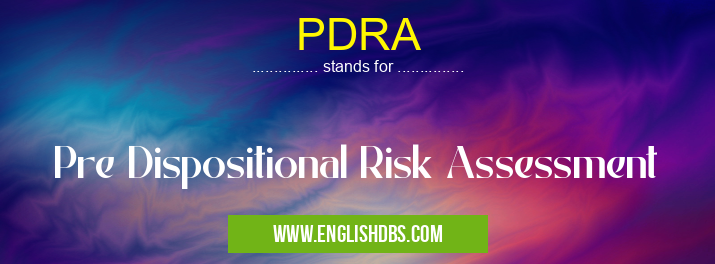What does PDRA mean in UNCLASSIFIED
Pre Dispositional Risk Assessment (PDRA) is an assessment tool designed to assess the risk of violence in adults and youths facing criminal justice involvement. It is used to evaluate factors such as a person's prior criminal history, risk of reoffending, and likelihood of responding favorably to interventions. PDRA helps agencies make informed decisions regarding appropriate sentencing or diversion options for individuals.

PDRA meaning in Unclassified in Miscellaneous
PDRA mostly used in an acronym Unclassified in Category Miscellaneous that means Pre Dispositional Risk Assessment
Shorthand: PDRA,
Full Form: Pre Dispositional Risk Assessment
For more information of "Pre Dispositional Risk Assessment", see the section below.
Essential Questions and Answers on Pre Dispositional Risk Assessment in "MISCELLANEOUS»UNFILED"
What is Pre Dispositional Risk Assessment (PDRA)?
How does PDRA work?
PDRA uses a comprehensive review process to identify which individuals should be targeted for intensive interventions, such as community-based supervision, court-ordered treatment, or deferred prosecution programs. The assessment looks at both static (unchanging) traits, such as past criminal offenses, as well as dynamic (changeable) factors, such as family structure or employment stability. The assessment results are then used to develop an individualized risk management plan that aims to reduce recidivism.
Who administers PDRA?
PDRA is typically administered by specially trained professionals in the criminal justice system with experience in assessing offender risk and developing appropriate interventions and strategies for managing each offender’s unique risk of recidivism. These professionals may include probation officers, parole officers, court personnel, victim advocates, prosecutors/attorneys, and other corrections/law enforcement personnel.
Is PDRA effective?
Yes! Studies have shown that when implemented properly and consistently, PDRA can effectively reduce recidivism among offenders who receive the assessments. Research has found that those assessed through PDRA were less likely to reoffend than those who did not receive an assessment.
Are there any limitations with using the PDRA?
Although it can be helpful in determining who may benefit from certain interventions or services that may aid in reducing recidivism rates among offenders, there are some inherent limitations with using this type of assessment tool. Due to its reliance on self-reported data from the offender and sometimes limited access to professional mental health evaluations or other forms of information about the individual's health or personal history (such as substance abuse issues), its accuracy may sometimes be compromised.
Does using a PDRA guarantee success for every person assessed?
No – it is important to remember that no single instrument can provide a perfect prediction for every individual assessed. Nonetheless, multiple studies have found that properly implemented assessments can help accurately predict recidivism rates across different populations. Therefore it can still offer helpful insights into how best to approach interventions for individuals facing criminal charges.
Is there research available on how successful PDRA has been?
Yes! There have been numerous research studies conducted on the efficacy of pre dispositional risk assessments in reducing recidivism rates among offenders. Results from these studies indicate that implementing pre dispositional assessments can help target specific offense risks that would otherwise go undetected by traditional methods.
